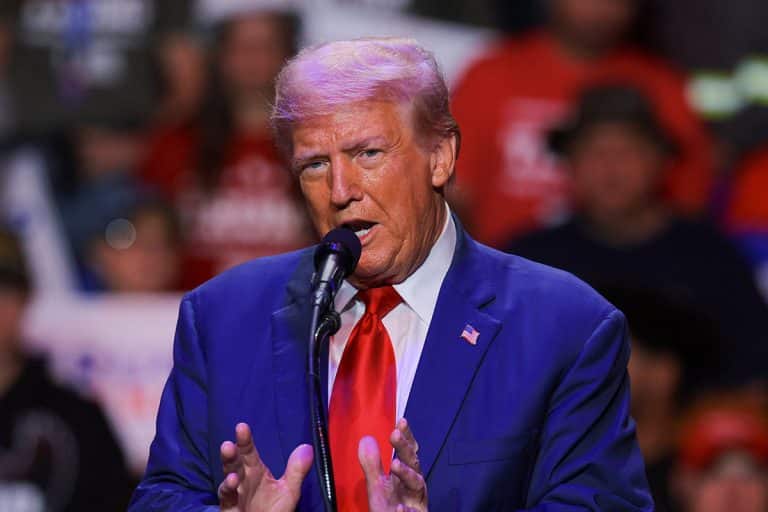Donald Trump’s stunning return to the White House could reshape the trajectory of Middle East conflicts, with his signature dealmaker approach potentially recalibrating both the Gaza war and tensions along the Lebanon-Israel border, regional analysts told Arabian Business.
Trump’s decisive victory over Kamala Harris, securing swing states including Georgia and Pennsylvania, marks the first non-consecutive second term in over a century and comes as the Middle East grapples with its most severe crisis in decades.
Business-first approach
“Trump doesn’t like geopolitics. He prefers geo-economics,” said Nicolas Michelon, CEO of Asia Intelligence Advisory.
“He wants to do business deals. Wars are bad for business.”
This transactional approach could significantly impact the ongoing conflicts, particularly as Trump seeks to address domestic American challenges through international dealmaking.
“This was America’s first geopolitical election,” said Abishur Prakash, geopolitical analyst and founder of The Geopolitical Business Inc.
“The solutions to the challenges facing Americans passes through the world stage, and in that setup, Middle East becomes not just important, but monumental to Trump’s efforts to solve the various challenges weighing on Americans.”
Ukraine-Middle East nexus
A key factor in Trump’s potential Middle East strategy could be his approach to the Ukraine conflict. Analyst Michelon suggested Trump might leverage a Ukraine ceasefire deal with Russia’s Vladimir Putin to influence Middle Eastern dynamics.
“It’s pretty obvious that the war in Ukraine will somehow end in 2025 once Donald Trump is inaugurated as President,” Michelon told Arabian Business.
“We could imagine that in exchange for offering Vladimir Putin a way out… the United States would ask for a favour in return from Russia, and that favor concerns the Middle East – that could be lowered Russian support for Iran.”
Such a deal could significantly impact Iran’s ability to support proxies like Hezbollah in Lebanon and Hamas in Gaza, potentially altering the regional balance of power.
Israel policy nuances
Despite assumptions about unconditional support for Israel, Trump’s approach might be more nuanced than expected.
“There is a belief that Trump will give Israel carte blanche, and this is what Iran believes,” Prakash said.
“But this leaves out a big part of Trump’s geo-strategy, which is he also deeply cares about the relationship with the Arab world, particularly Saudi Arabia.”
This dual focus could lead Trump to “redesign America’s relationship with Israel so that America doesn’t have to pick one side or another,” potentially influencing both the Gaza conflict and tensions along the Israel-Lebanon border.
Transition period crucial
The period before Trump’s January inauguration could prove critical for regional dynamics.
The outgoing Biden administration, according to Prakash, might accelerate certain initiatives, including recent warnings to Israel about military conduct in Gaza and ongoing negotiations with Saudi Arabia over a civilian nuclear programme.
“Biden is still the US president until the end of January… his focus is going to turn to legacy,” Prakash said, suggesting possible intensification of pressure on Israel regarding its military operations.
Iran nuclear shadow
The Iranian nuclear programme remains a critical factor in regional calculations.
“Even if Iran decides not to retaliate against Israel right now to see whether Trump can begin the process of introducing a ceasefire in Gaza or in Lebanon… Tehran is now effectively pursuing a nuclear weapon,” Prakash warned.
This development could put Washington and Tehran on what Prakash describes as “a collision course in the very near future,” regardless of any initial restraint Iran might show during the transition period.
The China factor
Trump’s anticipated focus on confronting China could reverberate through the region. His “America First” stance, which helped secure his victory, suggests a transactional approach to foreign policy that could prioritise American economic interests over traditional diplomatic considerations.
“Trump will most likely try to simplify the foreign policy equation that the United States has to deal with,” Michelon explained.
“Less proxy wars… so that the United States can refocus its attention on the confrontation with China.”
Regional implications
The president-elect’s victory comes as markets signal optimism, with the US dollar surging and bitcoin hitting record highs. However, his unrestrained isolationist and nationalist stance could have enormous consequences for regional stability.
As regional powers await the transition of power in Washington, the key question remains whether Trump’s deal-making instincts can effectively address the complex web of Middle Eastern conflicts while serving US interests in an increasingly multipolar world.
The immediate challenge will be managing the volatile situation in Gaza and preventing escalation along the Israel-Lebanon border, where Hezbollah’s engagement could trigger a wider regional conflict – exactly the kind of geopolitical crisis that might complicate Trump’s preferred focus on economic deals and China containment.






